SEO vs PPC: How Organic Search + Paid Search Works Together
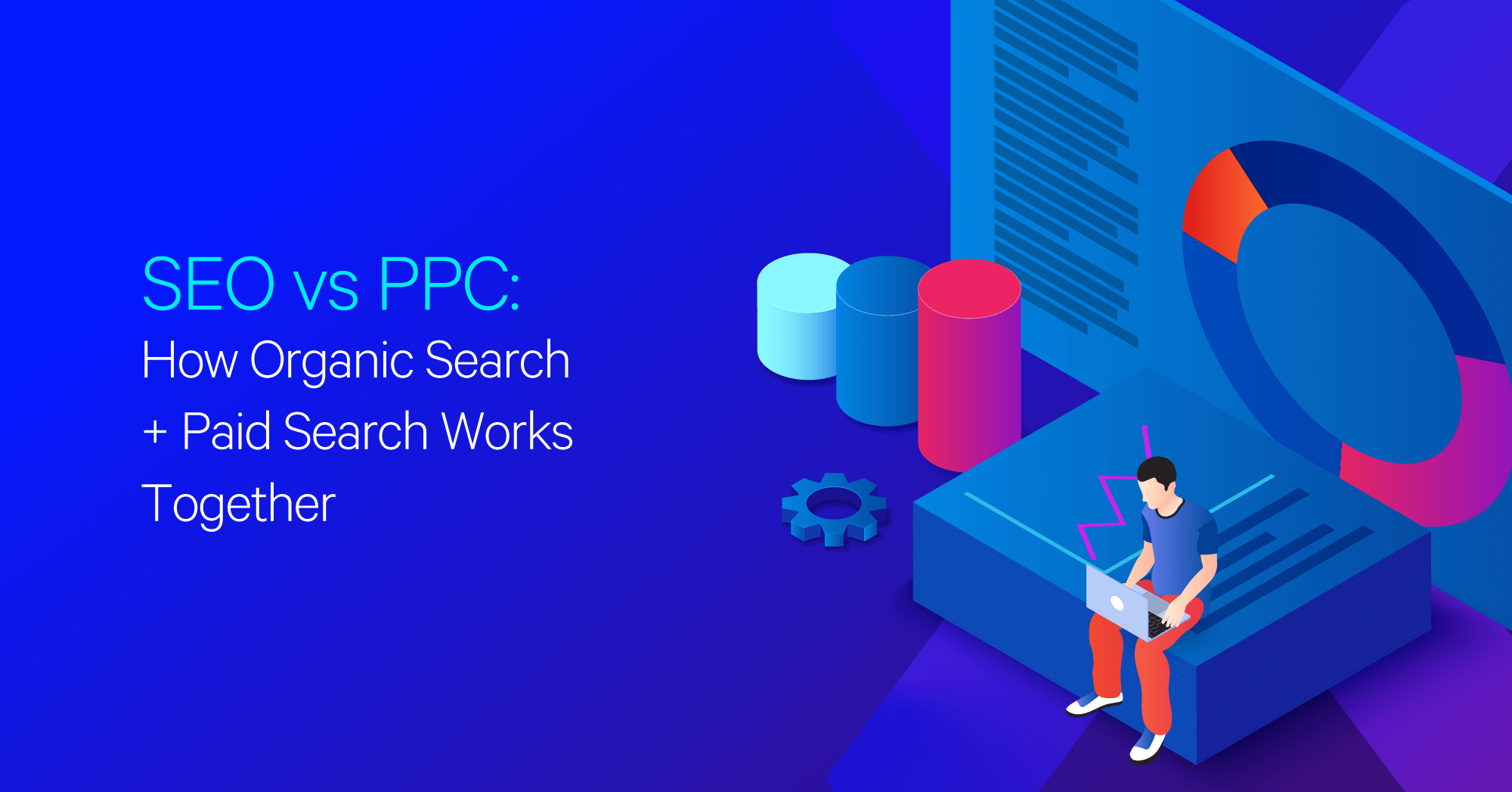
Hand off the toughest tasks in SEO, PPC, and content without compromising quality
Explore ServicesIn most organizations, the paid search team and the organic search are entirely separate departments.
But according to research by Google, SEO and PPC are more intertwined than not. SEO determines how many clicks PPC ads receive, and paid search can boost the results of organic search campaigns.
While most people view SEO and PPC as two separate entities, these two channels often work hand in hand.
In this blog post, I’ll go over the main differences between paid and organic search, and how you can develop a combined strategy to improve your business’ online marketing efforts.
Defining Organic Search and Paid Search
What is SEO?
I’ll start by defining what I’m referring to as SEO (also known as organic search) is in this article. Search engine optimization (SEO) is a strategy where you optimize your webpages to rank organically in search engine results.
Most businesses improve their search engine rankings by optimizing for keywords users are most likely to use when searching for your products and services. Focusing your marketing on organic search increases users’ likelihood of finding you when they search for things related to your product, service, brand, or business.
Optimizing for organic search grows your Google presence and brand awareness. Which, of course, is an essential factor if you want your company to succeed.
When you optimize for organic search, you increase your ranking in search engine results, thus improving your domain authority and boosting your visibility online.
You can improve your SEO doing things like:
- creating content
- refreshing your existing content
- creating citations for your business online
- Internal linking
- external backlinks
- Guestposts
SEO Pros
Unlike PPC, SEO is a more long term play with compounding benefits.
If you can rank highly in Google for your desired keywords, you can generate consistent search traffic to your website. Organic search drives 51% of all website traffic.
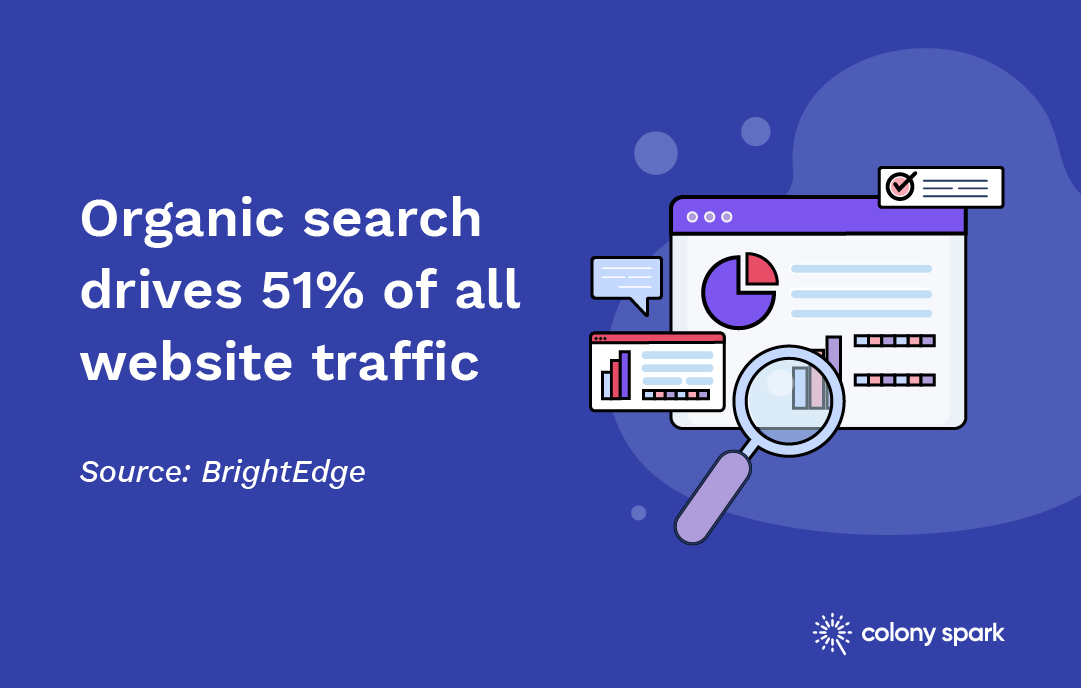
If you’re creating educational content, search is often a user’s first point of contact with your business.
SEO is an opportunity to show off your brand’s personality and stand out among the competition. Each of the following are content ideas that can help your brand stand out in search engine results:
- Write long-form blog posts
- Design infographics
- Develop presentations
- Publish case studies
- Create video
- Podcasts
Organic search results help you showcase your company’s value and brand personality.
Moreover, SEO is cheaper in the long-run than other paid methods. After all, technically, organic clicks are free and won’t cost your company a penny.
Building a good SEO strategy does take time and resources, but there are no ‘click’ costs like there are with PPC campaigns. With the right SEO strategy, you can get consistent, free traffic. If you’re looking for long-term, scalable results, SEO is your best bet.
SEO Cons
SEO is not without its shortcomings. For one, optimizing for organic search can take time. How much? Less than 5.7% of pages rank in the top 10 for at least one keyword within a year of publishing.
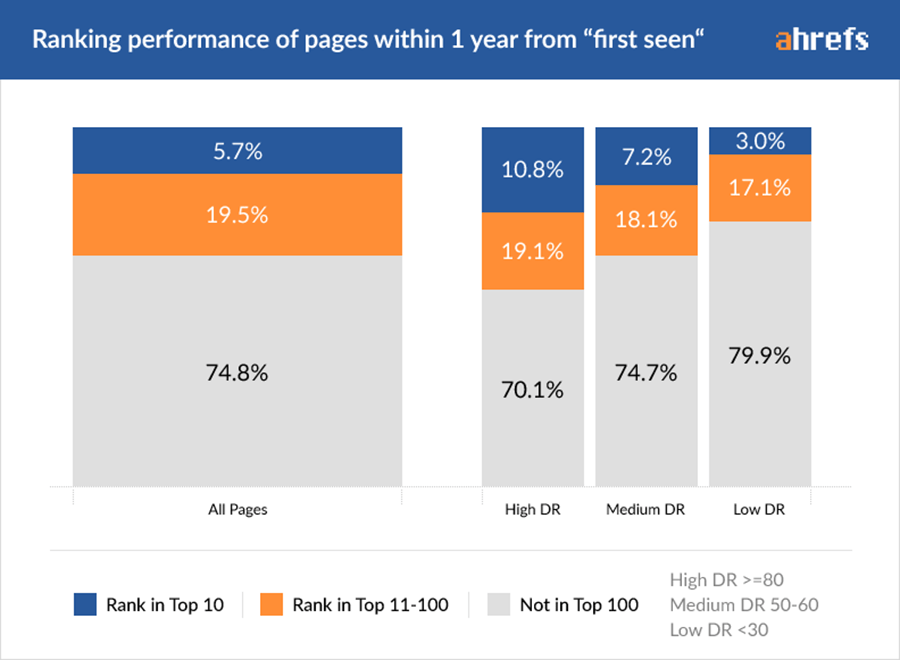
(Source: https://ahrefs.com/blog/wp-content/uploads/2019/08/ranking-study.png)
Realistically, don’t expect to see results before six months to start seeing results from your organic search efforts. That’s a big time investment for a new business.
SEO also comes with more roadblocks for startups. When people search for products online, they tend to purchase from well-established brands with robust reviews and social presence.
When it comes to sharing, consuming, and linking to content, people prefer to learn from industry experts.
To do well in search, you’ll need to show expertise. After all, there are thousands of other businesses on Google. Businesses with brand authority standout.
If you’ve already established authority and thought-leadership for your brand, this may not be a problem.
But for new businesses, this will involve potentially scarce resource allocation.
Some new businesses opt to hire someone to create content for them. But hiring a subject matter expert to create content for you can be pricey and is not a realistic option for many companies.
Creating your own content is a timely endeavor that will take you from other business operations.
To achieve organic search success in a competitive market, you need to invest serious time or money.
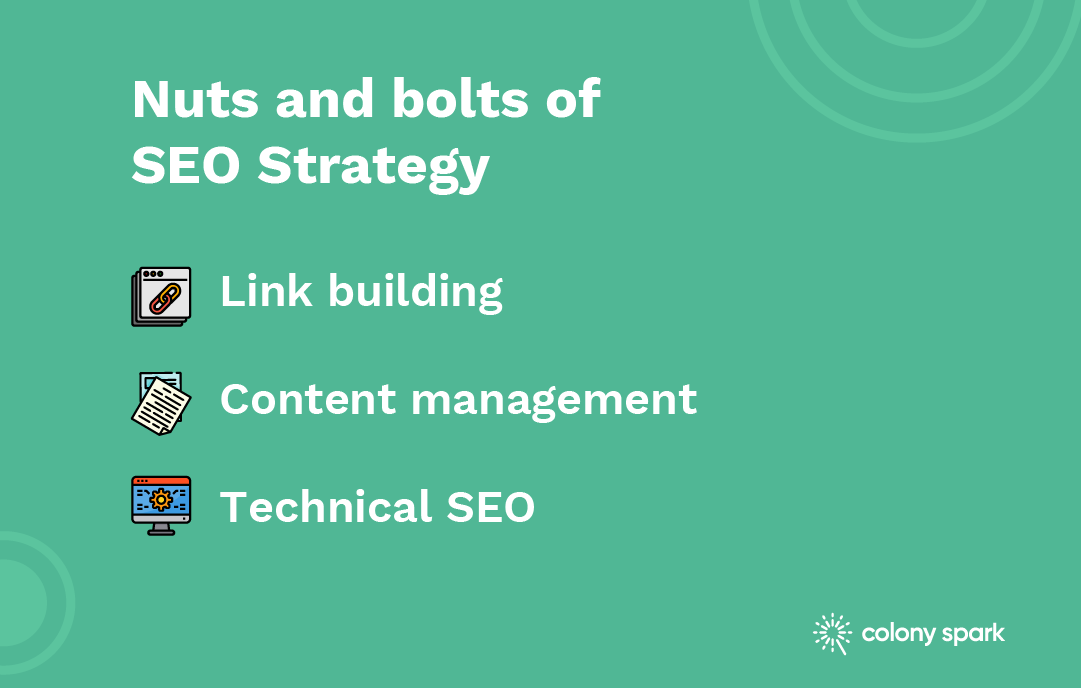
Creating a good organic search strategy involves doing link building, content management and technical SEO, which usually requires a team of experienced marketers.
What is PPC?
Pay-per-click (PPC) is a form of advertising where you pay every time a person clicks on your ad. Although PPC is typically associated with Bing and Google Ads, many Google alternatives also offer paid advertising options.
PPC is a channel that many businesses opt to invest in for a simple reason: positioning. After all, the top three spots on Google search results are usually ads, and they receive a whopping 46% of the clicks on the search results page.
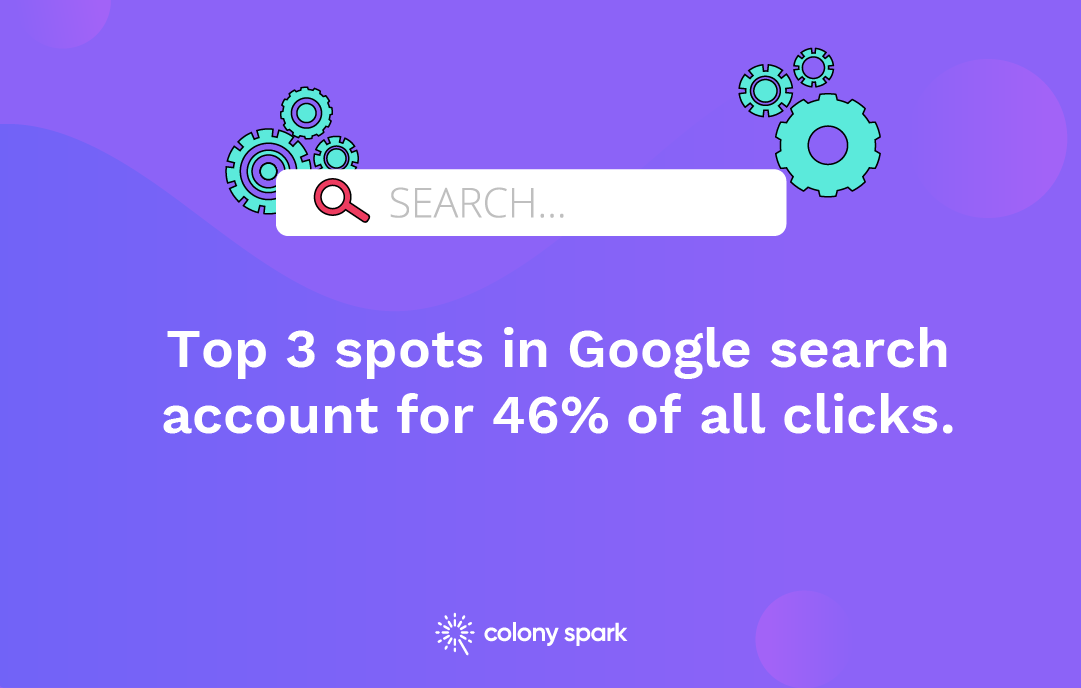
Rather than waiting patiently for your SEO to build up, you can get seen on page one of Google immediately with PPC.
PPC Pros
Let’s start with the obvious: you can generate results much faster with PPC than with SEO, and the platform options, from social media channels like Facebook to online forums like Reddit, the possibilities are endless.
Set-up is usually quick. You can go to any ad platform and get started almost immediately.
Not only that, PPC allows for greater experimentation with targeting. You target people with your ads based on location, interests, and buying habits, allowing you to segment for people more likely to purchase. You only pay for the people you want on your site.
You can get faster feedback with PPC as compared to SEO. With PPC, you can set up a campaign, run split tests, and monitor the results to figure out what’s working.
PPC Cons
Behind the idea of PPC is the adage that, “you need money to make money,” and if you’re a budding startup, that can be challenging. With PPC, you have to pay for every click that your ad receives, which may not be a problem for some industries; other industries can cost upwards of $100+ per click.
If you’re a new business with a limited marketing budget, it may cost a mint to start running profitable ads. With more businesses advertising online, competition for the same covered ad placements can be challenging.
Good PPC is rarely one note. If you keep the same PPC tactics, your campaigns can lose effectiveness. You have to continually refresh your ads with new creative to keep them working long-term.
SEO vs PPC: Is organic search or paid search best for my business?
Paid search and organic search are legitimate channels, but it may make sense in some cases to rely on one more than the other.
- If you have an innovative product, it’s unlikely people will be searching for your brand’s keywords. In such cases, it is best to utilize social media and PPC.
- If you have a short-term campaign, product launch, or a one-time offer, PPC may make more sense as SEO is more of a long-term marketing strategy.
How do SEO and PPC work together?
If you don’t fit the two scenarios above, PPC and SEO could work better hand-in-hand. Successful businesses use both SEO and PPC because they complement each other. After all, if both channels are profitable, why wouldn’t you want to do both?
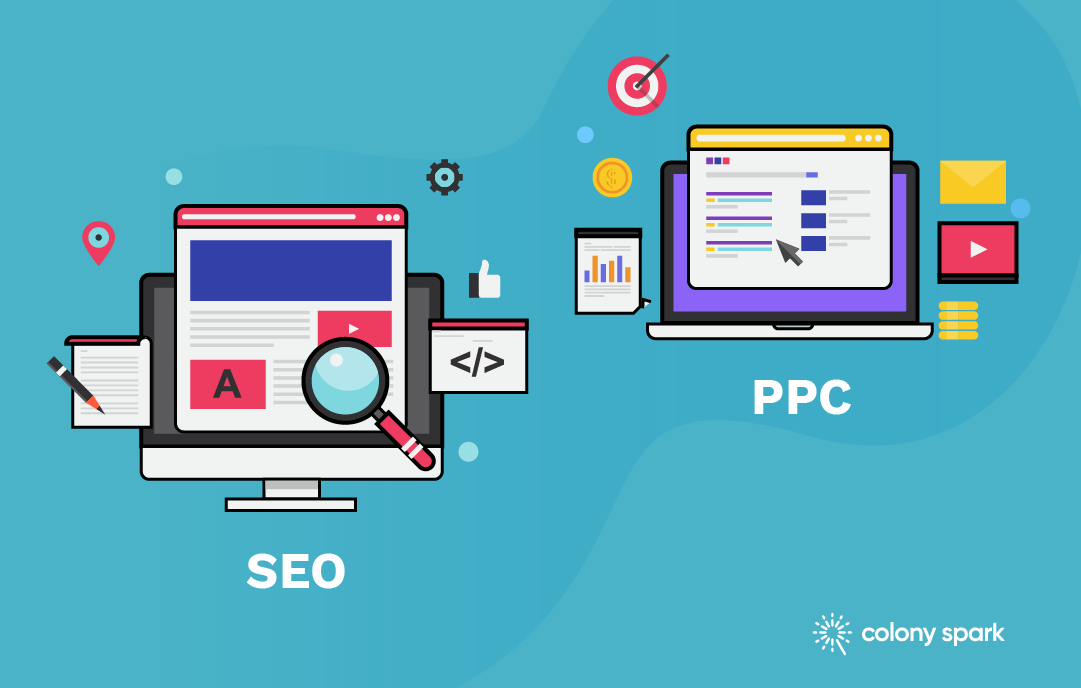
For startups, growing your audience and reputation is the first challenge. Using both SEO and PPC helps you gain visibility.
Having well-placed PPC ads AND ranking organically provides two means for users to find your business across the funnel, while creating a sense of authority around your company.
8 Benefits of Leveraging Paid and Organic Search
Why should you consider combining paid and organic search? Here are 8 (real) benefits you can get by combining SEO and PPC in your online marketing strategy:
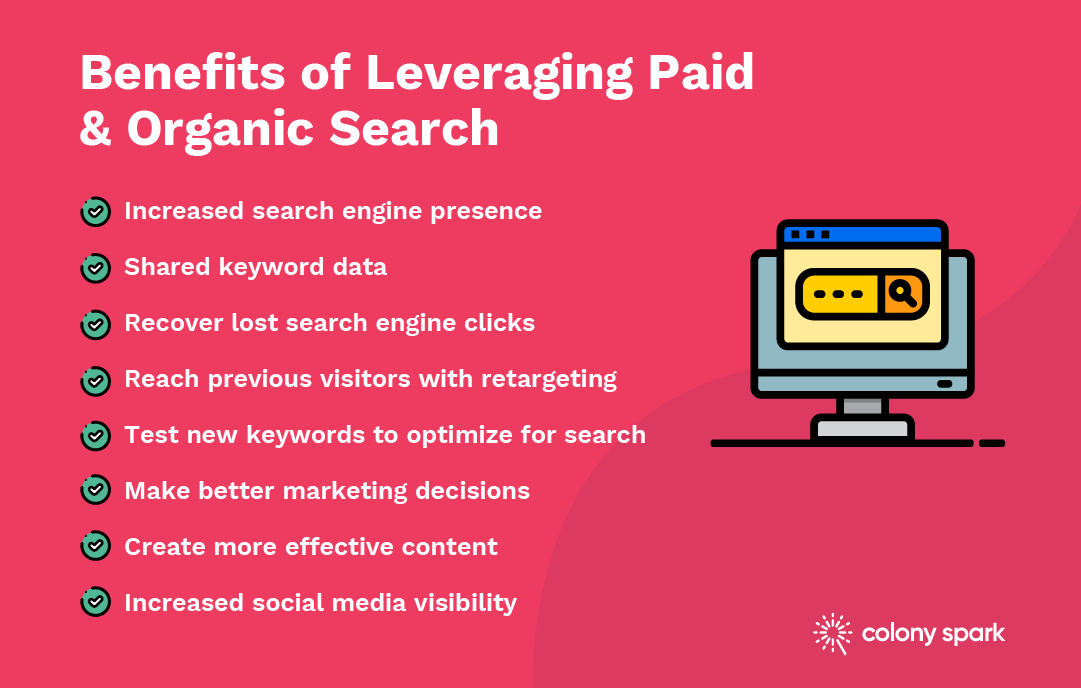
Let’s brief explore these in more detail:
1. Increased search engine presence
The top results on most search engine results pages are paid ads. Ranking high on organic search and paid searches helps you dominate the SERP and gives the impression that you’re an established brand in your market.
2. Shared keyword data
Running both organic and PPC campaigns give you double the data to analyze. By determining which organic and PPC keywords have the highest conversion rate, you can use that information to optimize your overall marketing strategy.
3. Recover lost search engine clicks
A Google study shows when paid ads for a keyword are paused, the organic rankings did not recover 89% of traffic generated by these ads – even if the site naturally ranked #1! Using PPC with SEO, you’re recovering clicks and interest from searchers that you might have missed with just SEO.
4. Reach previous visitors with retargeting
Combining your SEO with retargeting ads brings organic visitors back to your site to complete purchases or convert at a later time.
You can use PPC for video retargeting. For example, if a user has watched a video on one of your products, you can show them a Google Search ad when they search for your keywords with retargeting.
5. Test new keywords to optimize for search
PPC ads are a great way to tighten and refine your organic keyword strategy. As you start to get results from your long-term organic strategy, you can test the conversion rate of the words you’d like to rank for with PPC ads. Using PPC, you’ll get immediate feedback on the effectiveness of the organic keywords, which you can use to fine-tune your online strategy.
6. Make better marketing decisions
SEO and PPC work together to give you a large source of data for decision-making purposes.
With PPC, you can determine which keywords are the most effective in generating sales, and which keywords are sending unlikely buyers to your site. This data surplus will help you make smarter decisions about your marketing and future changes to your website.
7. Create more effective content
Using PPC and SEO together can boost your content strategy. By figuring out which PPC ads gives you the most conversions, you’ll make better decisions on creating meta descriptions, copy, and title tags for the webpages you want to rank organically. The biggest bonus of using PPC ads to test page attributes is you’ll know quickly what works and what doesn’t.
8. Increases social media visibility
Leveraging PPC on sites like Facebook, LinkedIn, and YouTube (owned by Google) can serve up ads targeted to incredibly specific groups of people.
The data you collect from these ad campaigns can uncover granular details about your target audience and refine your overall SEO strategy.
Closing Thoughts
To wrap up, I went over how combining SEO and PPC helps you:
- Increase your search engine presence
- Gain insights from keyword data
- Recover lost search engine clicks
- Retarget customers gained from organic traffic
- Test new keywords for SEO
- Make smarter marketing decisions
- Improve your content marketing strategy
- Boost your social visibility
So which is right for you?
SEO
It’s clear SEO is the better option for long-term conversions, traffic conversions, and ROI. And the stronger you get at SEO, the more benefits you’ll reap. Organic search allows you to display your creativity with various content types like blog posts, web pages, podcasts, infographics, and video presentations.
PPC
Choose PPC for time-sensitive campaigns, when you’re doing a new launch, or if you have an innovative product or service. PPC is best for short-term campaigns and when you need fast results. Or if you have the financial wherewithal to building profit-generating campaigns through an ad-only operation.
I personally prefer an omnichannel strategy.
The bottom line is don’t choose between organic search and paid search.
Simply understand the benefits and shortcomings of each, and use the right mix for your marketing goals. With the proper SEO tools and PPC tools, you can have both short-term as well as long-term ROI.
Organic and paid search is necessary for making a good marketing strategy. The positive relationship between organic SEO and paid search campaigns proves that today’s successful marketing department cannot be siloed. Bring your teams together and see how combining SEO and PPC can work for you.
Hand off the toughest tasks in SEO, PPC, and content without compromising quality
Explore ServicesWritten by Bill Murphy on October 23, 2020
Bill Murphy is the founder and chief strategist at Colony Spark, a marketing agency that serves early stage startups. Before the startup world, Bill was a political campaign staffer and still shares his opinions over @billmurphy.





